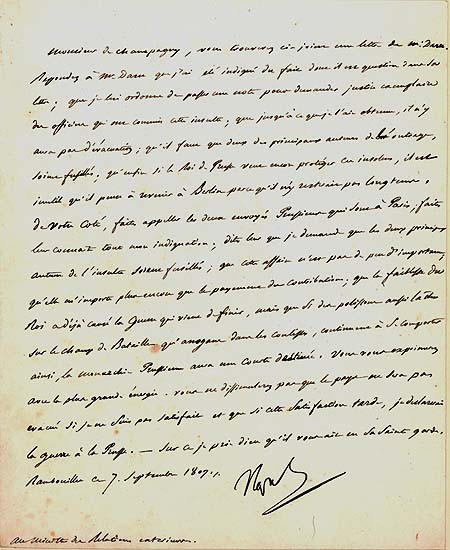This letter (for a transcription and translation, click here) addressed to Champagny and dated “Rambouillet, 7 September, 1807” is not entirely unknown since the minute held at the Archives nationales, Paris, was published by Lecestre. But the text of the document owned by the Fondation Napoléon is not exactly the same as the minute: the Fondation's letter would appear to be the one actually sent, in other words the copy rewritten by the secretaries and actually received by the minister. It relates an affair which occurred during the French army's occupation of Prussia, indeed an episode reported by Daru at the end of a news bulletin sent to Napoleon on 28 August. At Königsberg (today Kaliningrad), during the performance of a play entitled Fanchon la Vielleuse, Prussian officers whistled (i.e., boo-ed) when actors dressed as French officers came on stage. Napoleon considered this as an insult to the authority and dignity of the Grande Armée, and demanded sanctions – the execution of the officers -, even going so far as to threaten a recommencement of the war, only two months after the Treaty of Tilsit.
On 9 September, Champagny wrote in turn to Daru in application of Napoleon's instructions, but softening the violence of the imperial outburst. On 20 September, executing the orders received, Daru sent a note to the Prussian plenipotentiaries in Berlin containing the text of the letter to Champagny. In the meantime, the Prussian diplomats had sent Daru a note which gave a completely different, anodyne version of the story, not at all worthy the reprisals demanded by the emperor. Preferring to encourage appeasement and giving the benefit of the doubt, Daru managed to get the incident shelved on 8 October, 1807.
This extraordinary storm in a teacup over the 'Fanchon la Vielleuse incident' clearly shows the climate of tension which reigned between French and Prussian soldiers after the humiliating treaty which Napoleon had imposed upon a Prussia so famously (though perhaps unrealistically) proud of its military traditions. But even more importantly, the affair reveals the lasting resentment which Napoleon held towards that state. The harshness of the financial terms of the treaty, his clear desire to prolong the occupation, and his designs upon Silesia are all well known. But given the insignificant nature of the affair, the hate which pours from the letter to Champagny of 7 September, 1807, gives an extraordinary confirmation of Napoleon's state of mind.
Michel Kerautret (tr. P.H.)
October 2004
Letter from Napoleon to Champagny, Minister for Foreign Affairs

- Date :
- 7 September, 1807
- Place held :
- Fondation Napoléon, donation Martial Lapeyre

